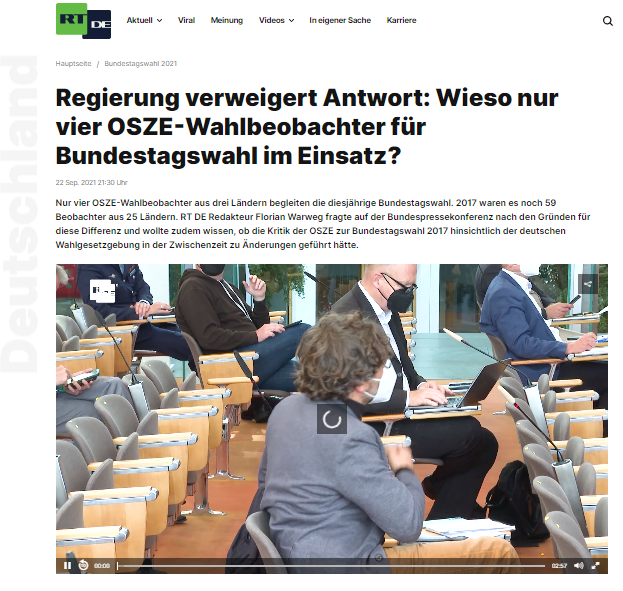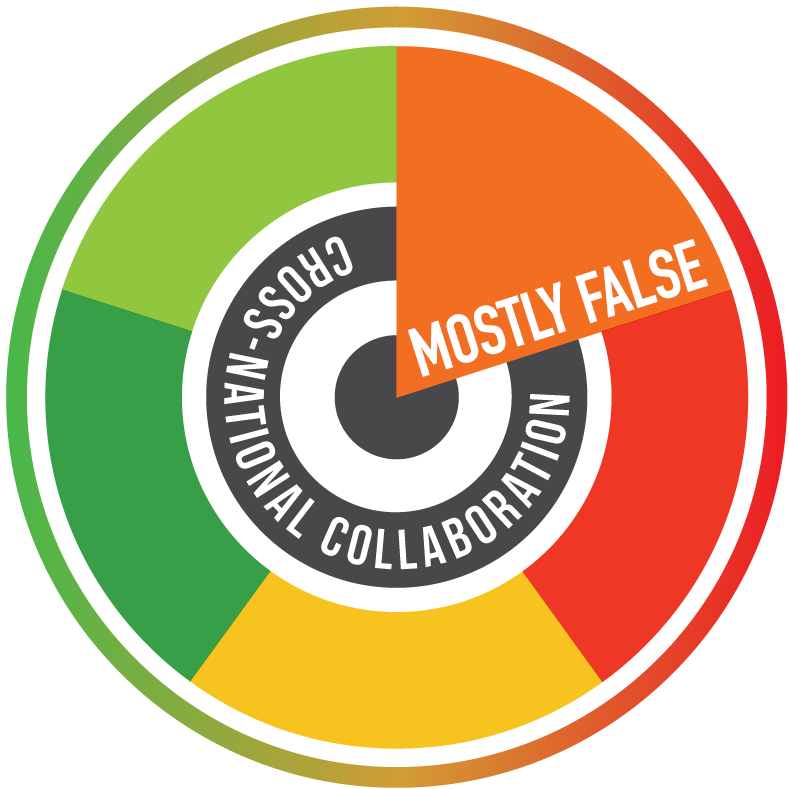Russia Today DE claims that there have been only four OSCE-observers at the German Bundestag elections this year, whereas there have been 59 at the 2017 elections. Though the numbers were not incorrect, RT DE left out crucial information about how they were formed, drastically changing the bottom line and possible interpretations of the claim.

The article consists of a transcript of a scene from the government press conference which took place on September 22nd. There, RT DE journalist Florian Warweg asked how the German government explained the difference between the number of observers between 2017 and 2021. The Interior Ministry press spokesman Marek Wede replied that he had no information to provide regarding this question. Andrea Sasse from the Foreign Office added that RT DE would have to direct the inquiry to the responsible office of the OSCE. RT DE subsequently wrote in its article that the government refused to answer the question.
Election Experts, observers and parliamentary delegates – the crucial difference
The OSCE has its own department for election missions, the Office for Democratic Institutions and Human Rights (ODIHR), which sends election observers to OSCE member countries. The purpose of these observers is to observe whether elections are conducted freely and according to democratic criteria. A proper ODIHR election observation mission consists of a core team of experts, and sometimes of additional long-term observers and short-term observers.
In 2013 as well as in 2017 and 2021, the ODIHR did not conduct a large observation mission in Germany, but only sent a small team of experts. The office explained that the team would not monitor the election or counting process in detail, but would only visit a small number of polling stations across Germany. In 2013, the team of experts consisted of two people, in 2017 there were three experts and in 2021 there were four. In other countries, the ODIHR conducts larger missions, for example in parliamentary elections in Georgia on October 31, 2020, where 13 experts, 27 long-term and 350 short-term observers were deployed.
So where does Russia Today draw its number of 59 experts and observers from? In 2017, there was an additional visit of 56 people, 43 of which were members of the parliamentary assembly of the OSCE. Those delegates were not sent by the ODIHR and although they did indeed observe polling stations, they were no short- or long-term observers as e.g. there were in Georgia during the elections in 2020 there. Those short- and long-term observers are also deployed by the ODIHR and usually sent weeks (long-term observers) or at least days (short-term observers) before the election. It is questionable if the parliamentary delegates followed such a procedure. In any case, this seems to be how RT DE calculated the number of “59 experts and observers”, although RT DE does not provide a link to its source. But there is at least one other source putting the number of parliamentary delegates at 50 from 20 different countries.
Experts View on RT DE’s Agenda and the significance of explaining details
RT DE left out information that could explain the difference in the amount of observers and experts between the 2017 and 2021 elections. Although the numbers themselves were not completely false, the claim cannot be rated as entirely true. Whether it ranks as mostly true or mostly false depends on the importance of the information left out as well as on a possible agenda behind the misdirecting use of the numbers in the claim.
The fact that RT is financed by the Russian Federation plays a significant role for the following views of political experts on a potential agenda of RT DE and its claim. Sarah Pagung is associate fellow at the German council on foreign relations currently working on her doctoral thesis examining how Russia exerts influence abroad. She assumes that RT DE did not leave out the information unintentionally. She sees a steady decrease of the legitimacy of Russian elections throughout the past years due to increasing authoritarian development (Shekhovtsov, A. 2021: Bogus International Monitors for the Bogus Russian Parliamentary Elections. European platform for democratic elections (epde). Via https://www.epde.org/en/documents/category/russia.html) within the country. The political scientist therefore estimates that the Russian government and the media surrounding it have an interest in counteracting this delegitimization of Russian elections by discrediting elections abroad – including in states of the EU such as Germany. At this point it is important to say that there is no statistical backup for her hypothesis.
Dr. Andrey Branitskiy, who works at the Institute of Foreign Affairs and History at the Russian Lobachevsky University provides a Russian perspective on the claim and the subject. He also estimates that the way RT DE presented its claim was intended, but doesn’t want to speculate why. Still he sees a judgemental, yet unnecessary subtone within the claim, hence the OSCE observation missions lack relevance from his point of view. Journalists in Russia seem to feel the same way. As can be read in our media analysis, they report just on the outcome of the election and its international consequences. Unlike in Germany, there was no media debate about the OSCE observers in Russian media. Branitskiy explains that the very nature of the Organisation is solely an observing and documenting one, but with no power to make decisions. He continues that there are more serious issues within the OSCE the organization should deal with. Furthermore, he adds that the topic of OSCE election observation missions is a highly specific one. The claim and the subject are discussed, but mainly by political experts involved with Germany’s domestic policy and therefore have next to no meaning for people living in Russia.
Sarah Pagung begs to differ, when it comes to the significance of the left out information especially in the political context of late September 2021. The Russian parliamentary elections took place one week prior to the parliamentary elections in Germany. According to Pagung, the OSCE intended an observation mission to Russia which was dismissed, because the Russian government limited the observation to a head count of 60 observers. The OSCE saw this amount as insufficient. The fact that there hasn’t been an OSCE observation mission during the Russian elections not only provides a possible motive for RT DE to discredit the German elections, but it could also undermine the credibility of the OSCE, says Pagung. She points out that the average reader has no chance of knowing the usual dimension of an OSCE election observation mission – this further increases the necessity of decoding the numbers claimed by RT DE.
Conclusion
Russia Today DE claims that there have been only four OSCE-observers at the German Bundestag elections this year, whereas there have been 59 at the 2017 elections. This is not false, but details were left out. According to political experts we spoke with, this might have happened intentionally and possibly in order to delegitimize or at least to discredit the German elections and the OSCE observation missions. The claim therefore should be ranked as mostly false.
Leave your comments, thoughts and suggestions in the box below. Take note: your response is moderated.
RESEARCH | ARTICLE © Heba Alkadri, Tatiana Gotishan, Nico Pershing, Jan Claas Rosebrock, Jade University of Applied Sciences Wilhelmshaven, DE and Lobachevsky University Russia





